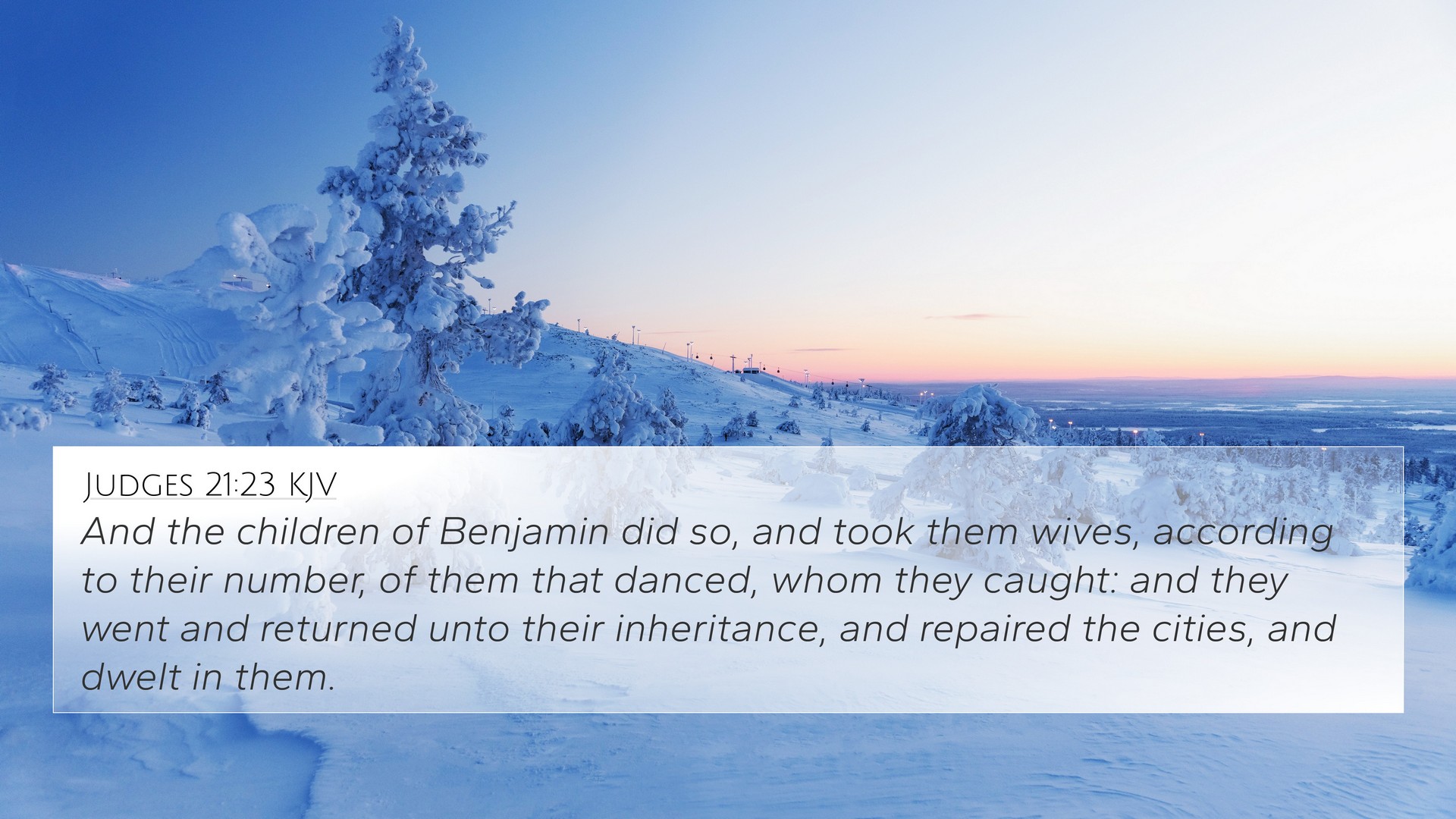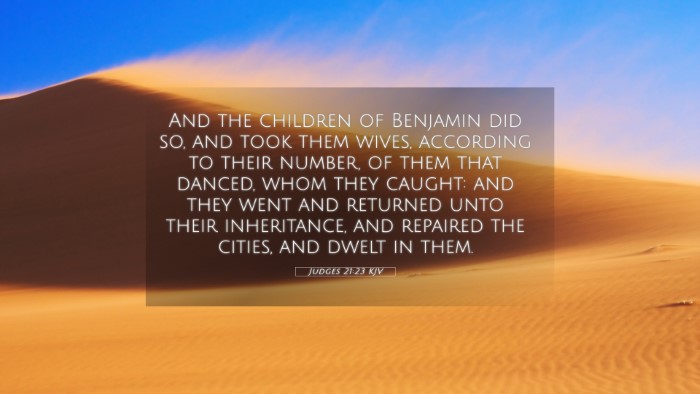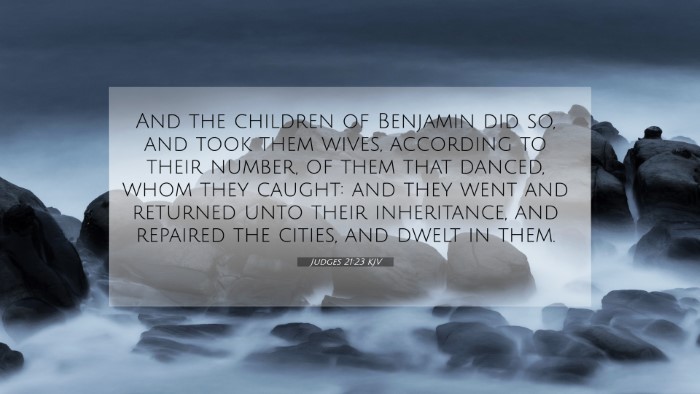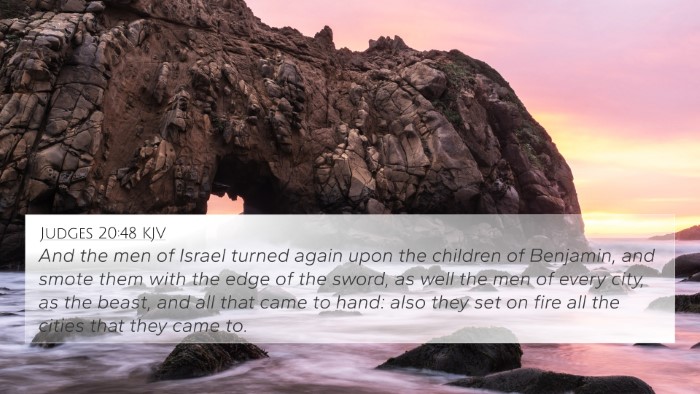Understanding Judges 21:23
Judges 21:23 reads: "And the children of Benjamin did so, and took them wives, according to their number, of them that danced, whom they caught: and they went and returned unto their inheritance, and repaired the cities, and dwelt in them." This verse concludes the narrative of how the tribe of Benjamin was restored after a civil conflict, illustrating themes of reconciliation and restoration.
Contextual Background
This passage occurs at the end of the Book of Judges, a time marked by chaos and moral relativism in Israel. After a brutal civil war, the remaining members of Benjamin are small in number and the other tribes are reluctant to let their daughters marry them, leading to a desperate strategy to find wives. The solution they employ highlights the lengths to which the Israelites go to preserve their kinship.
Thematic Insights from Commentaries
-
Matthew Henry's Commentary:
Henry reflects on the idea that divine providence is at work in even the most chaotic times. He emphasizes the moral issue of how the Benjamites resorted to abduction to find wives, pointing out the tragic situation of their near extinction.
-
Albert Barnes' Notes:
Barnes highlights the cautious approach the tribes took concerning the vows they made. The complexity of their moral choices in desperate moments brings forth the gravity of their sin in the civil conflict.
-
Adam Clarke's Commentary:
Clarke provides a deeper look into the traditions and customs of the time, noting that this event symbolizes the precarious state of Israel’s tribal confederacy. His insights encourage readers to consider the larger narrative of God’s faithfulness amidst human failure.
Bible Verse Cross-References
This verse connects with various other Scriptures, highlighting themes of restoration and human intervention. Below are some relevant cross-references:
- Genesis 24:67: Connection through finding wives within Israel, highlighting the importance of familial ties.
- Judges 11:30-31: A vow with God that reflects the complex motives and decisions made under duress.
- Deuteronomy 22:21: The moral implications of taking wives and the laws surrounding marriage and consent.
- 1 Samuel 11:14-15: The gathering of Israel's tribes for a common cause, paralleling the communal identity.
- 2 Samuel 17:27-29: Interactions involving provisions and familial ties amidst conflict, and the support of tribes.
- Ruth 1:4: The theme of Moabite women marrying into Israel, showcasing the issues of integration and lineage.
- Matthew 1:2-16: The genealogical implications of the Benjamites that tie back into the narrative of this verse.
Further Interpretations and Implications
This passage poses moral questions about societal survival. While the Benjamites' need to repopulate was dire, the methods employed raise significant concerns over ethics and divine injunctions. The intertwining relationships among tribes illuminate the complexity of human decisions under divine scrutiny.
Conclusion
Judges 21:23 serves not only as a historical account but also as a profound commentary on the nature of human actions, divine response, and community integrity. As readers engage with this text, they can appreciate the many layers of meaning and the cross-references that enhance understanding, allowing for a deeper appreciation of the Scriptures.
Tools for Bible Cross-Referencing
For those seeking to understand the connections between Bible verses, the following tools may be useful:
- Bible Concordance: An essential resource for finding specific words and their occurrences throughout the Bible.
- Bible Cross-Reference Guide: Provides thematic links and helps identify related verses efficiently.
- Cross-Reference Bible Study: Methods that encourage thematic exploration and comparative analysis.
- Bible Reference Resources: Materials that aid in understanding the interconnectivity of Scriptures.
Final Thoughts on Biblical Connection
This verse epitomizes the rich tapestry of Israel's history and the enduring lessons it provides. In understanding such verses, scripture seekers are encouraged to utilize various cross-referencing tools, enhancing their journey through the complexities of Biblical narratives.



